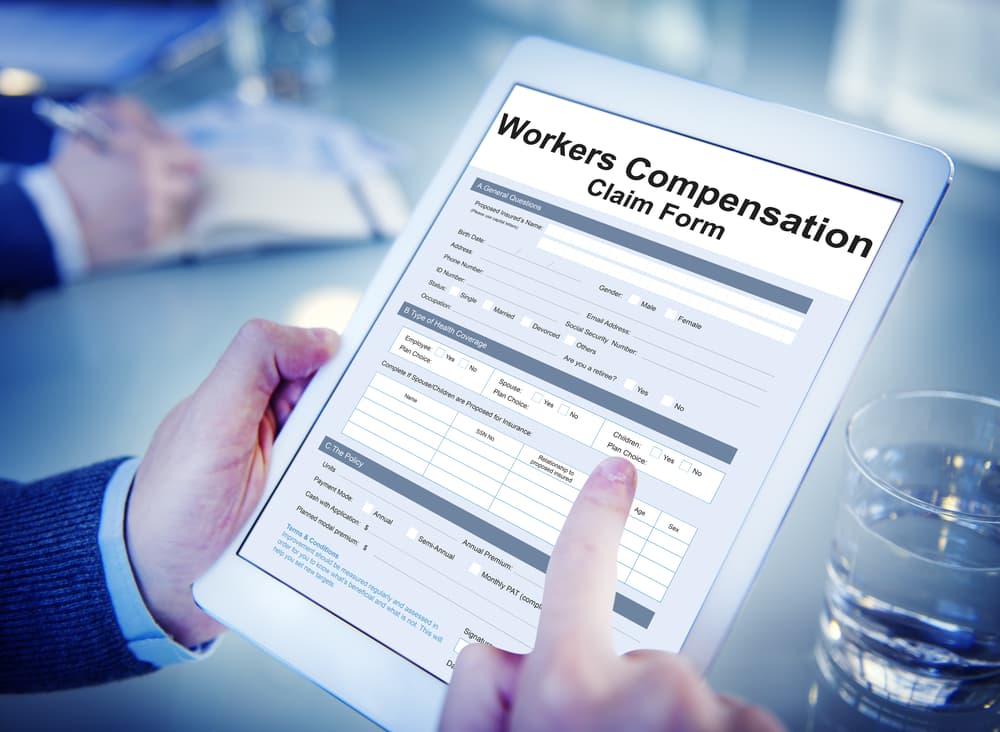How Long Do I Have to File a Workers’ Comp Claim?

When you’re injured at work and covered by workers’ compensation insurance, you have an avenue to pursue the compensation you need to battle your financial burdens. But how long do you have to file a workers’ comp insurance claim, and what happens if you miss a deadline?
Failing to file your workers’ compensation claim on time can negatively impact your potential for receiving proper benefits. A workers’ compensation attorney can ensure your claim is handled promptly and efficiently and seek the compensation you deserve for your work injury.
Schedule a Free Initial Consultation Today!
Workers’ Comp Insurance – What is it and Who Does it Benefit?

If you’ve not previously suffered an injury at work, you’re unlikely familiar with the workers’ compensation system. It’s important to understand what it is and how it works to provide you with benefits following a workplace injury or medical diagnosis.
Workers’ compensation, also called workers’ comp, is a government-mandated insurance that certain employers must offer their employees for protection. Employees who suffer harm due to their job can file a workers’ compensation insurance claim to receive benefits and compensation.
Offering workers’ compensation to employees is also beneficial to employers. Employers offer workers’ compensation insurance to protect themselves from potential liability after an employee sustains an injury. Also, because employees don’t have to prove liability or file a lawsuit, they may have the chance to acquire compensation much quicker.
Injuries and Illnesses Workers’ Comp Covers
Workers’ compensation covers a wide variety of injuries and occupational illnesses. The important detail is that the injury or condition must “arise out of” or be related to the employee’s work. Workers’ compensation does not cover injuries or illnesses that are not at all related to an employee’s occupation.
The two most common causes of workplace injuries are accidents and repetitive motions. Accidents at work usually depend on the employee’s line of work and job tasks but can include:
- Falls
- Vehicular collisions
- Electrocution
- Getting caught in or struck by equipment and objects
Injuries also frequently arise from repetitive motions, like lifting, pushing, and pulling. Repeated stress on the body can cause injury and the development of some conditions, like sprains and strains, carpal tunnel, and tennis elbow.
The development of occupational illnesses is also a possibility depending on a person’s job. Occupational conditions occur for various reasons, but they normally result from exposure to toxic chemicals and substances and risky work environments. Some common occupational medical conditions include certain cancers, asthma, and cardiovascular disease.
Employees Eligible to Receive Workers’ Compensation
Workers’ comp insurance varies by state. Therefore, state law dictates which employees are and are not eligible for workers’ comp protection. Generally, full-time and part-time employees benefit from the program. Specific types of employees are exempt, or not protected, under workers’ comp in many states, including:
- Volunteers
- Casual workers
- Independent contractors
- Real estate agents
- Farmers and farmhands
- Railroad workers
Some employees, including corporate officers and partners, might not need workers’ comp protection under state law but may opt to purchase insurance protection nonetheless.
Other types of employees may receive some protection in the event of an injury, but they are protected by different programs, including the Longshore and Harbor Workers Compensation Program and the Federal Employees’ Compensation Program.
If you’re unsure whether you have workers’ comp protection at work, discuss the topic with your employer. For additional questions and concerns, seek guidance from a workers’ compensation attorney in your area.
Types of Benefits Available Under Workers’ Comp

The benefits offered and the dollar amount you’re eligible to receive depend on your state’s workers’ comp laws. However, in general, workers’ comp offers certain benefits, including:
- Income replacement: Your doctor may require you to take some time off work while you heal. While necessary for your recovery, this can put you in a financial bind. Workers’ comp offers income replacement benefits, covering a portion of your lost earnings while you cannot work.
- Medical expenses: Medical treatment is necessary but particularly costly. Workers’ compensation provides compensation for medical expenses, allowing you to get the care you need without having to worry about the expense.
- Disability benefits: Some injuries result in disabilities, whether in the short or long term. Workers’ comp offers disability benefits to provide compensation and other assistance when your injuries leave you partially or totally disabled.
Some states offer additional benefits, including vocational rehabilitation to assist you with training and placement for a new job. Additionally, when an employee dies due to their work injury or medical condition, workers’ comp offers families death benefits to aid with related expenses, including funeral and burial costs..
Deadlines for Filing Workers’ Compensation Claims
When you’re in the process of filing a workers’ comp claim, there are several details you must take note of, including deadlines. Multiple time constraints exist, dictated by your state’s workers’ compensation laws, including deadlines to report your injury and file your claim. Missing a deadline can impact your chances of obtaining favorable compensation.
Reporting the Injury to Your Employer
After sustaining an injury at work or receiving a diagnosis of an occupational illness, you must notify your employer. Written notification may not be necessary, but it is usually best. Write a detailed report, sign and date it, and retain a copy for your records.
The deadline to report your condition to your employer depends on your state’s laws. Some states require you to notify your employer right away or as soon as you reasonably can, depending on the circumstances. Other states have more specific deadlines, often within seven to 90 days.
Regardless of your state’s laws, it’s best to notify your employer as quickly as possible. The sooner you report your injury, the quicker they can begin working on their end to get your claim filed.
Filing the Workers’ Comp Claim

The process for filing a workers’ compensation claim depends on your state’s procedures. In some states, your employer notifies their insurance company, but filing the actual claim with your state’s workers’ compensation agency is your responsibility. Other states require employers to file the claim on your behalf. To ensure your claim is filed properly and on time, find out how filing works in your state.
Typical deadlines for filing workers’ comp claims vary from one to three years. However, some states allow more time, especially depending on the specifics of the situation and injuries. Limited exceptions exist in many states, including when the injury is severe and requires prolonged treatment or results in a coma.
Work Injury vs. Occupational Illness
Deadlines for work injuries are commonly different from those for occupational conditions.
The timeline for filing a workers’ comp claim is usually longer for occupational illnesses. This is because medical conditions normally develop over time, and you may not even know you’re suffering from any illness or disease right away. Conversely, injuries are usually apparent immediately after an accident or very shortly after that.
State workers’ comp law may state the deadline for filing a claim is a set number of years after the “date of injury.” For an occupational injury, this may be the date you first experienced symptoms or a disability or the date you knew or should have known you were suffering from a medical condition caused by your occupation.
Reopening a Workers’ Comp Claim
Some employees, especially those working in particularly dangerous work environments, are prone to reinjury and worsening an existing condition. If you had a previous workers’ comp claim that has been resolved, but your condition has worsened, you may have the opportunity to reopen your claim to begin receiving benefits once again. However, you only have a certain period to do so, normally three to five years after your claim closes.
Lawsuits for Workplace Injuries
When you file a workers’ compensation insurance claim, you cannot also file a lawsuit against your employer for additional compensation. Nonetheless, you may be able to file a lawsuit against other parties that contributed to your work injury.
Workers’ comp does not protect third parties, only employers. Therefore, if a third party, like a contractor or maintenance company, causes your accident or injuries, you can file a lawsuit for compensation.
Lawsuits for work injuries fall under personal injury law. Statutes of limitations dictate how long injured plaintiffs have to file suit against defendants. Depending on your state’s statute of limitations, you may have one to six years to file your claim in court.
If you’re unsure whether you have a legal claim for your work injury, discuss the situation with a workers’ compensation attorney. A lawyer can determine whether you have a valid claim and, if so, how long you have to file your lawsuit under state law.
The Workers’ Comp Claim Process
Every state has varying workers’ comp procedures to file claims for benefits. Still, the following steps are typically involved in the claim process.
Getting Medical Care
Regardless of the circumstances, always put your health first. If you’ve experienced a work accident, seek medical care right away, especially if your injuries are severe and require immediate attention. For non-emergent injuries and occupational illnesses, schedule a doctor’s appointment as soon as possible or visit an emergency room.
Medical records play a significant role in workers’ compensation claims. For this reason, seeking treatment and a proper diagnosis are essential.
Notifying Your Employer About Your Condition
As mentioned, notifying your employer is of the utmost importance. Therefore, you should report your injury or condition to your employer as soon as you can.
Based on your state’s procedures, your employer can immediately notify their insurance company and file the necessary documentation. If you need to file any forms, you can also do so. You may receive forms from your employer to fill out and submit or download them from the workers’ compensation agency website and file them electronically or by mail.
Seeking Legal Guidance from a Workers’ Comp Attorney

While you’re not legally required to hire a workers’ compensation lawyer, doing so can benefit your claim.
Schedule a consultation with a local workers’ comp attorney as soon as you can. During your consultation, the lawyer can provide valuable insight, including details about your rights and the claim process, and determine how best to proceed with your claim.
A workers’ compensation lawyer not only gives you peace of mind during a challenging time but also a better chance of obtaining the benefits you need and deserve.
Ensuring Your Claim is Filed Timely
When your employer files your claim, you’ll want to follow up to ensure they filed everything on time. You can also request copies of the forms and documentation they submitted to their insurance company for your records.
In addition, whether you or your employer filed the claim, you can check on the status of your claim through your state’s workers’ comp agency website.
Waiting for the Insurance Company’s Decision
Once the insurance company receives your filing, they investigate the details of your injury or condition to decide whether to approve or deny your claim. In some states, insurers only have a short time to investigate and render their decision, usually around 30 or 60 days. You can take additional action if they fail to notify you within that time.
If the insurance company approves your claim and offers fair compensation, you’ll receive your benefits shortly after. A workers’ comp attorney can handle an appeal if you receive a claim denial.
File Your Workers’ Comp Claim Timely with the Help of an Experienced Attorney
When you’re injured at work or receive a diagnosis for an occupational illness, do not wait to take steps to file your workers’ comp claim. Waiting too long to take any necessary steps can negatively impact your claim, and you may end up forfeiting your rights to compensation.
As soon as possible after your injury or diagnosis, you should discuss your situation with a workers’ compensation lawyer. An attorney can protect your rights as an injured worker and ensure you don’t miss any important claim deadlines, giving you a greater chance of securing workers’ comp benefits.

